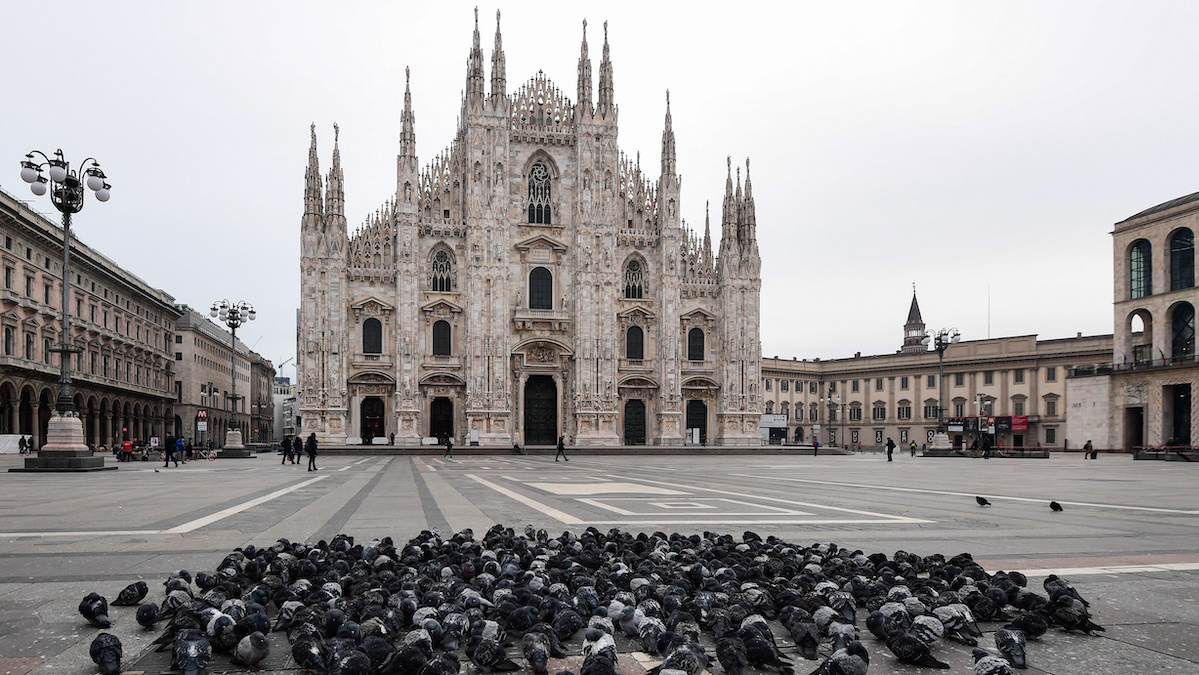

Pigeons gather on Piazza del Duomo by Milan's cathedral on March 10, 2020. Italy imposed unprecedented national restrictions on its 60 million people to control the deadly coronavirus. MIGUEL MEDINA / AFP via Getty Images
The entire country of Italy has gone into lockdown to prevent the spread of the new coronavirus, officially known as COVID-19.
The measures, announced by Prime Minister Giuseppe Conte Monday night, will ban public gatherings for Italy’s more than 60 million people and prevent them from traveling between towns and cities except for emergencies.
“There is no more time,” Conte said, as The Guardian reported. “I will take responsibility for these measures. Our future is in our hands.”
Il futuro dell’Italia è nelle nostre mani. Facciamo tutti la nostra parte, rinunciando a qualcosa per il bene della collettività. In gioco c’è la salute dei nostri cari, dei nostri genitori, dei nostri figli, dei nostri nonni. Ho appena firmato il decreto #iorestoacasa pic.twitter.com/Cagtzf7hnQ
— Giuseppe Conte (@GiuseppeConteIT) March 9, 2020
Italy is facing the worst coronavirus outbreak in Europe and has seen the most deaths from the new virus outside China, according to The New York Times. As of Monday, 9,172 Italians had fallen sick and 463 people had died, 97 more than on Sunday.
“The figures show we are experiencing a serious increase in infections, an increase in people hospitalised in intensive care – and an increase, unfortunately, in deaths. We need to change our lifestyle. We need to change it now. That’s why I have decided to adopt these hard measures,” Conte said, according to The Guardian.
His decree also makes Italy the first European country to enact dramatic restrictions comparable to those that seem to be working in the more authoritarian China, The New York Times pointed out.
On Tuesday, Chinese President Xi Jinping visited Wuhan for the first time since the new disease emerged there in December 2019. The city, and the surrounding province of Hubei, have both been on lockdown in quarantine measures that appear to be working. His visit came as China reported its lowest number of new cases to date, BBC News reported.
“He is there now to reap the harvest. His being there means the Communist Party of China (CCP) may declare victory against the virus soon,” Renmin University professor Zhang Ming told Reuters, as BBC News reported.
But this is not the case outside China, where, as CNN put it, “the situation is growing increasingly dire.” According to the most recent World Health Organization figures, there have now been 113,672 confirmed cases in 110 countries and more than 4,000 deaths.
Italy hopes to control its outbreak with its newly restrictive measures, which include, according to The Guardian:
- A ban on all public events
- The closing of bars, movie theaters, gyms, clubs and other gathering spots
- The cancellation of all funerals, weddings and sporting events
- The closing of all schools and universities until April 3
- Fines or as many as three months of jail time for those who travel between cities without legitimate reasons
The decree also included a ban on prison visits, which set off riots in prisons across the country, BBC News reported. Seven inmates died.
Giovanni Rezza, director of the infectious disease department at the National Health Institute, told The New York Times that Italy’s restrictions were “necessary” and that other European countries like France and Germany should follow its example.
- Coronavirus Spreading in U.S. Could Cause 'Severe' Disruption to ...
- As Coronavirus Infections Rise, CDC Is Criticized - EcoWatch

 233k
233k  41k
41k  Subscribe
Subscribe 